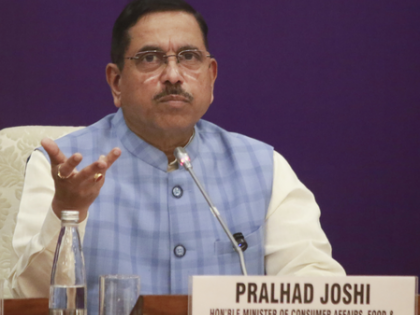India delivers solar power 24/7 at a cost lower than coal: Pralhad Joshi
By IANS | Updated: June 3, 2025 12:33 IST2025-06-03T12:28:09+5:302025-06-03T12:33:17+5:30
New Delhi, June 3 Union Minister for New and Renewable Energy Pralhad Joshi on Tuesday highlighted that solar+storage ...

India delivers solar power 24/7 at a cost lower than coal: Pralhad Joshi
New Delhi, June 3 Union Minister for New and Renewable Energy Pralhad Joshi on Tuesday highlighted that solar+storage in India is now cheaper than industrial electricity tariffs in most states, as these prices have been fixed for decades, citing a new study.
“This breakthrough is a game-changer for India’s industrial competitiveness. It also stands as a testament to the vision of Prime Minister Narendra Modi for achieving sustainable growth,” the minister said in a statement on X.
India can now deliver round-the-clock electricity at under Rs 6/kWh, cheaper than coal-fired plants and insulated from inflation for 25 years, according to a study by the India Energy and Climate Center (IECC) at the University of California, Berkeley.
The study titled ‘Plummeting Solar+Storage Auction Prices in India Unlock Affordable, Inflation-Proof 24/7 Clean Power', states that battery storage costs in India have fallen by more than 50 per cent in the last 18 months. As a result, the combined cost of solar with storage is now lower than power from new coal-fired plants.
Solar+storage in India is now cheaper than industrial electricity tariffs in most states -- and these prices would be locked in for decades," said Dr Nikit Abhyankar, author of the study and faculty member at the University of California.
India's competitive edge stems from low capital costs for solar installations -- nearly one-third of those in the US -- along with declining battery prices that now match those in China. "With battery pack prices now under $60/kWh and total system costs rivalling those in China, India is replicating its solar success in storage," said Dr Amol Phadke, co-author of the study.
The report also points out that India's industrial electricity tariffs have averaged nearly Rs 8/kWh in 2025, with costs expected to rise. In contrast, solar+storage systems provide fixed-rate electricity for 25 years, offering predictable and lower-cost clean power to industry. Even with added transmission charges, the systems remain cost-effective for industrial users.
India's solar energy capacity has taken a massive leap in the last 11 years from a mere 2.82 GW in 2014 to an impressive 105.65 GW as of March 31 this year, according to official figures.
Solar energy has emerged as the new driving force of India’s renewable energy thrust, a senior official said.
The total installed solar capacity of 105.65 GW comprises 81.01 GW from ground-mounted installations, 17.02 GW from rooftop solar, 2.87 GW from solar components of hybrid projects, and 4.74 GW from off-grid systems. The growth demonstrates continued uptake of solar energy across utility-scale and distributed categories, he explained.
The expansion in the installation of solar power generation capacity has been backed by a robust domestic production of solar cells and wafers, which was almost non-existent in 2014, the official further stated.
India has now built a strong foundation with 25GW of solar cell production and 2GW of wafer production.
Prime Minister Narendra Modi has fixed a target of 500 GW for renewable energy capacity by 2030 as part of the country’s goal to reduce its carbon footprint in the fight against climate change.
Disclaimer: This post has been auto-published from an agency feed without any modifications to the text and has not been reviewed by an editor
Open in app